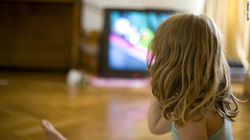
“secondhand TV”. So of course, I continued watching the CNN segment to get to
the bottom of this horrible thing. Matthew Lapierre, an assistant professor of
communication studies at the University of North Carolina Wilmington, explained
how the high number of background television is surprisingly high and we should be very concerned. This is the first study of background TV and Lapierre believes, “background TV is something that researchers need to spend more attention to, to understand and unpack.”
After interviewing a national representative sample of parents about their household’s TV habits on a regular weekday and weekend, Lapierre and his colleagues learned that background TV was especially common in certain populations. The Children under the age of two, African-American children, children living in poverty and kids with less-educated parents had at least five hours of background television a day. The children in the white population and more affluent families only acquired two and half to three hours a day. Now, after hearing Lapierre’s outcome I couldn’t help but ask myself where Allison fell in that research. She is four years old, not African-American, not living in poverty, and I like to consider myself very well educated. So where did that leave us?
Although there are no known side effects of secondhand TV, Lapierre and his colleagues have done a few small studies that have shown some differences. Background TV was linked to shorter attention spans, a lower quality of parent-child interactions, and some poorer academic performance. These are some behaviors shown in children who are exposed to secondhand TV but
the research is still in its early stages so they have not been fully proven yet. Sara Rivero-Conil, a pediatric psychologist at Miami Children's Hospital, adds, that the impact may be different for different ages and activities the children are doing while exposed to the background TV. Rivero-Conil also states, “The constant flickering and sound of a nearby TV may be even more distracting to school-age children and as kids get older, they're more likely to be drawn to the actual content on the screen, at the expense of their homework or other tasks.” I agree with Rivero-Conil, I also believe what is actually playing on the TV while the child is conducting the activity may make a difference as well. In our case, I had CNN on and Allison paid no attention to the TV. If I were to change the channel to Nickelodeon, I’m sure her attention would drift from her homework to the TV.
Pediatricians have gotten word of this research and are concerned as well. The American Academy of Pediatrics made a policy statement in 2011 about the secondhand TV. The published pediatrics are urging to inform the parents of children under the age of two to be aware that what they are watching on TV can negatively affect their children and may distract both, the child and the parent.
After viewing this CNN story, I plan on making some changes to our TV viewing habits in our household. Even though this may not be a major issue, but I would not take any risks in my daughters’ health or educations. With some simple changes, I believe
the problem can be easily fixed. We no longer have the TV on while Allison, or I, am studying or doing homework. I have also decided to leave the TV off during breakfast, lunch, dinner, and bed time. I now only allow the TV on while all homework and studies are done, and it is no longer left on when no one is watching. Not only will this rid of our “secondhand TV” problem, it will lower the cost of my light bill. “Killing two birds with one stone”.
If you happen to be another concerned parent and would like more info on "secondhand TV", the story is available on the CNN website.
